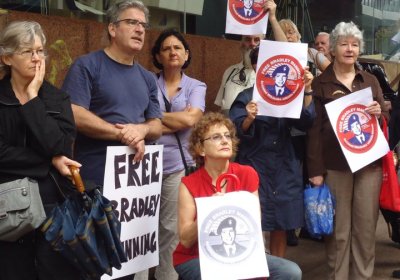“As rain poured down last night, I thought I can’t possibly go this morning, but then I got on WLCentral this morning and Daniel Ellsberg has been arrested in his 80s outside the White House, so we can brave a little rain!”
874
Former Haitian president Jean-Bertrand Aristide, Haiti’s last elected president, has finally returned home.
He was kidnapped from Haiti in a US-backed coup in 2004 and exiled in South Africa until his March 18 return.
Aristide returned to a country still devastated by last year’s earthquake. The US and its allies broke their promises to provide badly needed aid.
Two months earlier, Jean-Claude “Baby Doc” Duvalier, the notorious former dictator overthrown in a mass rebellion in 1986, also returned to Haiti.
Two days after staging a rooftop protest, Burmese Rohingyan refugees inside the Northern Immigration Detention Centre (NIDC), received a notice on March 17 from the immigration department.
“Your concerns about the delays in finalising cases are understandable,” it said.
Australia is one step closer towards embracing disability as part of human diversity. On February 28 the Australian Government Productivity Commission released a draft report on Disability Care and Support.
If the general recommendations of the report were to be implemented, people with disability, their families and carers would achieve a much-needed improvement to their lives, albeit starting in 2014-15.
The report recommends a doubling of funding to the disability support system based on 2009-2010 spending, financed from general revenue.
What's the best mix of electricity supply sources for Australia in the context of growing scientific and public concern about climate change? Energy efficiency and conservation provide the first part of the answer — they can provide large, quick, cheap greenhouse emissions reductions.
This poem, by Afrodity Giannakis, is translated from Greek, It was published in a book also entitled Stowaway.
* * *
A stowaway in your life,
a refugee in your land,
an exile in your country,
a foreigner in your homeland,
of your history — you’d think —
an invisible viewer.
Forever inside
waiting rooms.
A patience test.
An endurance test
in the age of abstention.
The only power they have left you:
Gossiping life.
Talking about life
behind her back.
The federal ALP government is pushing ahead with the punitive system of “income management” despite the fact that it is racist, unfair and expensive.
In June 2010, the federal government passed legislation allowing the extension of welfare quarantining beyond the 73 Northern Territory remote communities that were its first target.
Campaigners won a stunning victory on March 21 when the WA Environmental Protection Authority (EPA) announced that there is “adequate information to demonstrate that Vasse Coal Management’s coalmining proposal is environmentally unacceptable”.
EPA Chairperson Paul Vogel said: “In effect, this is an EPA ‘no’ to the proposal.”
The proposed Vasse coalmine was to have been 15 kilometres from the popular tourist destination, Margaret River.
Internationally renowned as a wine-growing region, Margaret River is in the south-west of Western Australia.
The statement below was published by the Boycott, Divestment, Sanctions Working Group (South Africa) on March 23. It’s abridged from www.pacbi.org .
* * *
Today, setting a worldwide precedent in the academic boycott of Israel, the University of Johannesburg (UJ) has effectively severed ties with Israel’s Ben-Gurion University (BGU).
This was after UJ’s Senate rejected a last ditch motion by pro-Israeli lobbyists to have two separate bilateral agreements — one with a Palestinian University and another with an Israeli University.
There has been intense activity in 2011 around the social and community services pay equity wage case pursued by the Australian Services Union (ASU) and four other unions.
The claim, which was lodged in March 2010, is rapidly approaching its conclusion.
Since late January 2011, there has been:
• A new round of site visits, during which members of the Fair Work Australia tribunal hearing the case visited public sector workplaces to see how the work compared to that in the non-government sector.
Coal seam gas exploration is becoming a key political issue in NSW. The Labor and Liberal parties are pushing for a huge expansion in gas mining, including coal seam gas.
But farmers, regional communities and city-dwellers are becoming increasingly worried about the health and environmental consequences of the gas rush.
The NSW government recently approved energy company AGL’s bid to drill 90 coal seam gas wells and build a pipeline and processing centre near Gloucester, north of Sydney.
Aboriginal man Mulrunji Doomadgee died in custody at Palm Island police station on November 19, 2004. His liver had been cleaved almost in two. Nearly three years later, senior police sergeant Chris Hurley told Townsville Supreme Court he had come to terms with the fact that he caused the death.
- Previous page
- Page 2
- Next page








